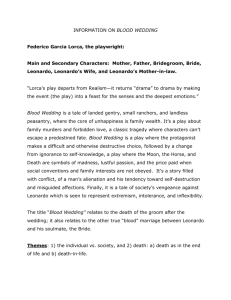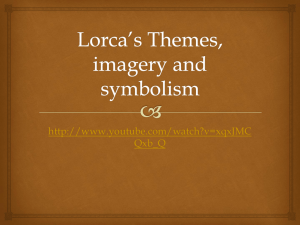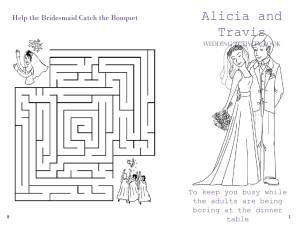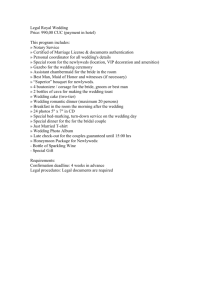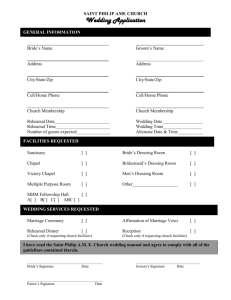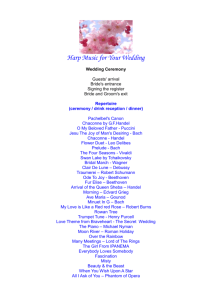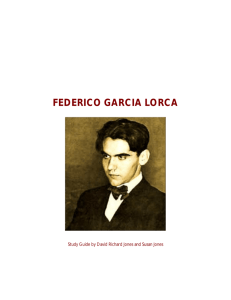EUROPEAN ACADEMIC RESEARCH, VOL
advertisement
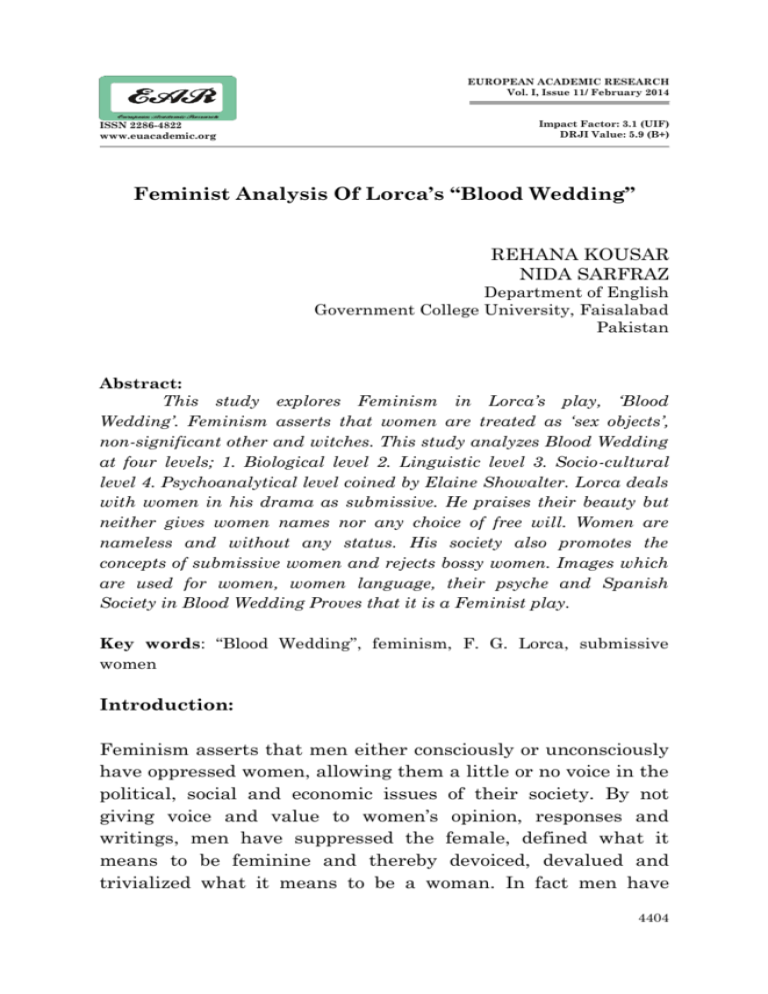
EUROPEAN ACADEMIC RESEARCH Vol. I, Issue 11/ February 2014 ISSN 2286-4822 www.euacademic.org Impact Factor: 3.1 (UIF) DRJI Value: 5.9 (B+) Feminist Analysis Of Lorca’s “Blood Wedding” REHANA KOUSAR NIDA SARFRAZ Department of English Government College University, Faisalabad Pakistan Abstract: This study explores Feminism in Lorca’s play, ‘Blood Wedding’. Feminism asserts that women are treated as ‘sex objects’, non-significant other and witches. This study analyzes Blood Wedding at four levels; 1. Biological level 2. Linguistic level 3. Socio-cultural level 4. Psychoanalytical level coined by Elaine Showalter. Lorca deals with women in his drama as submissive. He praises their beauty but neither gives women names nor any choice of free will. Women are nameless and without any status. His society also promotes the concepts of submissive women and rejects bossy women. Images which are used for women, women language, their psyche and Spanish Society in Blood Wedding Proves that it is a Feminist play. Key words: “Blood Wedding”, feminism, F. G. Lorca, submissive women Introduction: Feminism asserts that men either consciously or unconsciously have oppressed women, allowing them a little or no voice in the political, social and economic issues of their society. By not giving voice and value to women’s opinion, responses and writings, men have suppressed the female, defined what it means to be feminine and thereby devoiced, devalued and trivialized what it means to be a woman. In fact men have 4404 Rehana Kousar, Nida Sarfraz- Feminist Analysis Of Lorca’s “Blood Wedding” made women a non-significant other. Simon De Beauvoir says in her book Second sex, ‘One is not born but rather becomes woman’. Lorca’s “Blood Wedding” is a Spanish play which deals with the theme of love and marriage and highlights the customs and traditions of Spanish society. The Zenith of the arc, the center of the play’s structure is the wedding itself. Here two men contend for the bride, a vessel that contains the potentiality both for life and death. The Bridegroom offers her the fulfillment of her tribal destiny, peace and fertility within nature. Leonardo offers separation from the tribe – an individuation that contains death. For Leonardo and the Bride both situations are tragic. This study highlights the ways in which women in Spanish society are victims of feminism. It proves that women are treated as sex objects, goddesses of beauty, bitches, witches and submissive creatures applying four levels such as biological level, linguistic level, socio-cultural level and psychoanalytical level. Jane Tompkins says in Me and My Shadow, What enrages me is the way women are used as extensions of men, mirrors of men, devices for showing men off, devices for helping men get what they want. They are never there in their own right or rarely. The world of western contains no women. Sometimes I think the world contains no women. Literature Review: Feminism is not a new prospective to analyze books rather than it is a voice that women rose for their right after 1st World War. It gained a voice when Virginia Woolf wrote her book, ‘A Room of one’s own’ in which she says: “It is the male, who defines what it means to be female and who controls the political, economic, social and literary structures”. (Bressler 1994: 104) Simon de Beauvoir in her book, The Second Sex, asserts: “In a patriarchal society male defines what it means to be human, including, therefore, what it means to be female.” (ibid) EUROPEAN ACADEMIC RESEARCH - Vol. I, Issue 11 / February 2014 4405 Rehana Kousar, Nida Sarfraz- Feminist Analysis Of Lorca’s “Blood Wedding” Jane Tompkins altogether rejects the second hand representation of women both in society and in literature that’s why she says in her book, “Me and My shadow”: What enrages me is the way women are used as extensions of men, mirrors of men, devices for helping men get what they want. They are never there in their own right or rarely. Sometimes I think the western world contains no women. And sometimes I think the world contains no women. (Bressler 1994:102) Different critics praise Lorca for his dramatic technique, a blur of lyrics and dramatic representation, and his themes originated from Spanish society as it is said in “A Composition to Federico Garcia Lorca”: Lorca has come to embody the cliches associated with Spain and particularly Andalusia whether it is in terms of his Latin temperament or the perceived folkloricism of some of his texts. (Bonalodd 2007, 5) Most of critics study the drama as a tragic drama as M. Loewen says: The wedding itself was to be an event of great joy which would bring promise life, union and fulfillment. The singers call the girl a lucky one.” “But actually two are left stiff with their lips turning yellow… without a single man ever having seen himself in the whiteness of her breast. (text). Methodology: This study is qualitative. It focuses on the feminist analysis of “Blood Wedding” at four levels: biological level, linguistic level, psychoanalytic level, and socio-cultural level under the prospective of Elaine Showalter. This study focuses only on Lorca’s play Blood wedding. The study is based on the close reading of the text, after that chunks are marked, interpreted and analyzed. EUROPEAN ACADEMIC RESEARCH - Vol. I, Issue 11 / February 2014 4406 Rehana Kousar, Nida Sarfraz- Feminist Analysis Of Lorca’s “Blood Wedding” The Feminist Analysis of The Text: Biological Level: This study analyzes the Blood Wedding at four levels. First level is biological which focuses on the images of female body. It also focuses how various parts of female body become significant images in a feminist text. For example the neighbour lady in the text says about the face of woman, “Beautiful. Her face glowed like a saint’s.” This line illustrates that woman is presented as goddess of beauty. The first appearance of the Bride shows her subservience as Bride appears, “her hands fall in a modest pose and her head is bowed”. Women are only taken as symbol of beauty. Woman is only a source of attraction for male. Male is attracted towards woman due to her physical appearance. As Leonardo says to Bride: “It’s not my fault, The fault is of the earth And this fragrance that you exhale From your breast and your braids” Various parts of female body such as uterus and breasts often become significant images in feminist text. As father says about her daughter, “my daughter is wide hipped.” Treachery and fertility are the characteristics of woman. Lorca use the image of snake for the women, snake also symbolizing treachery and fertility. He calls the woman as “you snake”. Linguistic level: Language also shows that male is authoritative in society. Communication between male and female shows that male is bossy. He gives orders to woman. In this play when mother expresses her grief Bridegroom says to mother: “be quite” and “let’s quit this talk!” EUROPEAN ACADEMIC RESEARCH - Vol. I, Issue 11 / February 2014 4407 Rehana Kousar, Nida Sarfraz- Feminist Analysis Of Lorca’s “Blood Wedding” Woman in this play cannot share her feelings with her male counterpart. There is no space to outlet her feelings. If she tries to express her feelings male does not allow her to express. As the dialogue between wife and husband shows this: Wife: don’t leave me like this, not knowing anything. Leonardo: stop that. Wife: No, I want you to look at me and tell me. Leonardo: let me alone. (He rises) Wife: Where are you going love? Leonardo: (Sharply) can’t you shut up? Father also reprimands Bride when she meets the mother formally. Father: you shouldn’t be so solemn. After all, she’s going to be your mother.” Socio-cultural level: In Spanish society men have oppressed women allowing them little or no voice in the social, political and economic issues of their society. The dialogues between mother and Bridegroom do not give importance to his mother’s view regarding marriage. “Mother: I know the girl is good… but even so when I say her name, I feel as though someone had hit me on the forehead with a rock. Bridegroom: Foolishness.” Women in “Blood Wedding” according to mother are best if they were confined in home as she says: “Do you know what is to be married child?” “A man, some children and a wall two yards thick for everything else”. The Bride has two ways to lead her life; either she chooses mother’s life, marries and lives a stagnant life or follows her passion and dies along with her lover. Society does not give right to woman to choose her life partner. In Lorca’s society the woman is considered decent when she follows the first way; the way mother lives. As Bride’s father hopes that her daughter EUROPEAN ACADEMIC RESEARCH - Vol. I, Issue 11 / February 2014 4408 Rehana Kousar, Nida Sarfraz- Feminist Analysis Of Lorca’s “Blood Wedding” cannot flee with another man hopes: “It could not be my daughter. Perhaps she’s thrown herself in the well” And mother says: “Decent women throw themselves in water not that one.” In Spanish society priority is given to son. Sons are needed because of the masculinity and power to harvest the land, as it is shown in the dialogue of Father and mother. As Father says; “I want them to have a lot of them (children). This land needs hands that are not hired… lots of son are needed.” As mother says to Bridegroom: “if you can make me happy with six grandchildren… or as many as you want” In Spanish society land is also bought for sons. Male has the right of inheritance. As Father says: “If I had sons. I would have bought all this mountain side.” Women lead a miserable life. They are dependent on men. Males do not give proper status to women. They are not treated justly. Leonardo’s wife is leading a miserable life. She loves her husband but her husband does not love her. He is in love with Bride. She bears all this patiently. For Leonardo her wife is only a source to satisfy her sexual desires. As Leonardo’s wife says: “I have a son. Another is coming. And so it goes. My mother’s fate was same well I’m not moving from here.” Women is taken as submissive while man is considered as authoritative as mother advices her son how to control her Bride. She says: “She’ll feel you are the man, the boss, the one who gives orders.” Lorca totally negates the authority of women in her society. All qualities that are praised in drama are of maid not of bossy EUROPEAN ACADEMIC RESEARCH - Vol. I, Issue 11 / February 2014 4409 Rehana Kousar, Nida Sarfraz- Feminist Analysis Of Lorca’s “Blood Wedding” woman. As Father says: “No need to tell you about my daughter. At three when the morning star shines, she prepares the bread. She never talks: soft as wool, she embroiders all kinds of fancy work and she can cut a strong cord with her teeth.” And mother says: “I know the girl is good, is not she well behaved, hardworking, kneads her bread and sews her skirts.” For Feminist writers marriage is an oppressive and exploitative economic arrangement which reinforces sexual inequality and binds women to domesticity. In Spanish culture marriage is also taken only in terms of sex. As servant says in Blood Wedding: “What’s wedding…is it sweets or the bouquet of flowers… no it’s a shining bed and a woman.” She further says, “O, lucky you are going to put your arms around a man and kiss him and feel his weight.” Psychological level: Feminists assert that society shapes a women’s understanding of herself, her society and her world. Concept of pure woman along with a concept of a maid is too deep rooted in the psyche of Spanish woman to narrate. As mother says, “yes but have some girls, I want to embroider and make lace and be at peace.” And bride calls herself as a bitch “naked looking over the fields as though I were a bitch” Because of her society’s attitude towards woman. Spanish society oppresses women to such an extent that they wish they were male. As Bride says, “Have not I done a man’s work, I wish I were a man.” EUROPEAN ACADEMIC RESEARCH - Vol. I, Issue 11 / February 2014 4410 Rehana Kousar, Nida Sarfraz- Feminist Analysis Of Lorca’s “Blood Wedding” Conclusion: By analyzing the ways in which physical appearances of women are presented, society’s attitudes towards women, language and Spanish culture, this work shows that women are the victims of feminism in “Blood Wedding”. BIBLIOGRAPHY: Barry, Peter. 1995. Beginning theory: an introduction to literary and culture theory. New York: Manchester University Press. Bonalodd, Federico (ed.) 2007. A companion to Frederico Garcia Lorca. Wood bridge: Boydell & Brewer Ltd. Bressler, Charles E. 1994. Literary Criticism: An Introduction to theory and Practice. New Jersey: Prentice Hall. Loewan, Mathew. The Nature of Tragedy in Lorca’s Blood Wedding. Lorca, Federico Garcia. 2005. Blood Wedding. Translated by Simon Scardifield. London: NHB EUROPEAN ACADEMIC RESEARCH - Vol. I, Issue 11 / February 2014 4411
